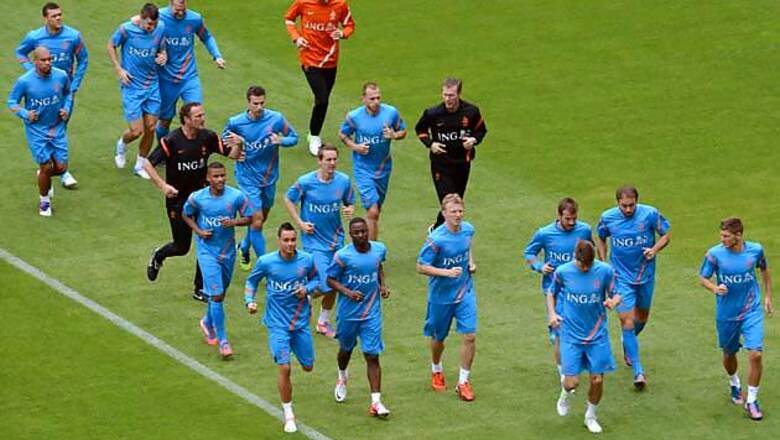
views
Krakow (Poland): Both are ranked in FIFA's top four. They finished second and third at the last World Cup. If that were not enough — it's the Netherlands vs Germany, one of the biggest grudge matches in football, and of all sport for that matter.
And to compound matters, the Netherlands needs to win Wednesday's Group B game to claw its way back into the European Championship. A loss would probably mean elimination and, coming at the hands of the victorious Mannschaft, would make it particularly stinging.
"You can lose to anyone, but you just cannot lose to Germany," said Dutch fan Ivo Frank, who had come to cheer the team at their training camp in southern Poland with a group of friends all in their twenties.
"Or better put: beating anyone is sweet, beating Germany is sweeter," he said. "This is like Manchester United versus City. There is nothing like it."
In rugby, it is New Zealand vs. South Africa. Cricket has the age-old England vs Australia rivalry, so nasty in 1932-1933 it had their governments in uproar. In the United States, baseball has its New York Yankees vs. Boston Red Sox matchup which also stretches across the history of the game.
Even though the Netherlands vs. Germany series stretches back over a century now, it became especially intense when the Dutch became almost as good at the game as their neighbors under the command of Johan Cruyff in the 1970s.
At the time, the Dutch earned the moniker "the greatest team never to win the World Cup" and they can blame then-West Germany for that.
In the bitterly fought 1974 final rife with penalty incidents and disputed calls, Franz Beckenbauer's team came out on top 2-1 and the stage was set for bruising and often nasty encounters.
"I was not born yet in 1974, but I have been hearing all about it," said Bart Bierens, bedecked in orange glasses and T-shirt with the battle cry "Aanvallen!-Attack!" written across the front.
Germany won with a disputed penalty after Bernd Hoelzenbein went down in the area in what the Dutch still see as the best and biggest dive in football history. At the time, World War II had ended less than a generation earlier and anti-German feelings still ran high.
At the time, Dutch fans would revisit the days when the Nazis impounded Dutch bicycles and melted them down to make weapons. A popular shout from the stands was: "I want my bike back!"
It provided an added zest to the rivalry.
Now Germany and the Netherlands are among the closest allies in the European Union, standing shoulder to shoulder during the financial crisis. Both defend rigorous budgetary policies in the face of countries that seek more public spending.
They were no such friends yet in 1988, when the Dutch came to Germany and relied on a late strike from Marco van Basten to beat the hosts in Hamburg's semifinal. It was an equally bitter duel which spilled over into the streets during the hooligan days of football.
Then, two years later at the 1990 World Cup, German striker Rudi Voeller and Dutchman Frank Rijkaard were famously involved in a spitting flareup after both were sent off. Germany won the game and went on to earn its third World Cup. It also did not endear fans to each other.
Years later, Rijkaard and Voeller came together and made a goodwill advertisement together.
It is also the way the rivalry has gone. It may be among the most competitive matches, but it rarely spills over the edge anymore.
Some of the best Dutch players like Schalke 04's Klaas-Jan Huntelaar and Bayern Munich's Arjen Robben play in the Bundesliga now and the rivals played a friendly as recently as November, during which Germany beat the Netherlands 3-0.
Wednesday's game in Kharkiv, Ukraine, will have little of a friendly about it though.
Germany can already assure itself of a place in the quarterfinals with a win after it beat Portugal 1-0 on Saturday. And a 1-0 loss to Denmark leaves the Dutch no option.
"You simply have to beat Germany. That is clear," said Netherlands coach Bert van Marwijk. Elimination at the group stage would be the worst result for the Oranje since the side failed to reach the 2002 World Cup finals.
And coming on the heels of losing the 2010 World Cup final, elimination after a week of play for FIFA's fourth ranked team would amount to a humiliation.
Germany, ranked one spot higher at three, knows the Denmark loss might make the Netherlands even more dangerous.
"The Dutch are with their back against the wall. That won't make it easier," Germany midfielder Sami Khedira said.




















Comments
0 comment